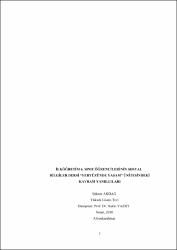| dc.contributor.advisor | Yazıcı, Hakkı | |
| dc.contributor.author | Akdağ, Şükran | |
| dc.date.accessioned | 2015-03-26T09:36:32Z | |
| dc.date.available | 2015-03-26T09:36:32Z | |
| dc.date.issued | 2010 | |
| dc.date.submitted | 2010 | |
| dc.identifier.uri | http://hdl.handle.net/11630/3368 | |
| dc.description.abstract | Sosyal Bilimlere ait bazı önemli kavramlar ilk olarak sosyal bilgiler dersinde verilmektedir. Bu dönemde öğrenciye verilebilecek her türlü yanlış veya hatalı bilgi öğrencilerin kavramları yanlış anlamalarına neden olmaktadır.
Bu çalışmanın amacı, ilköğretim sosyal bilgiler dersindeki “Yeryüzünde Yaşam” ünitesinde, 6. sınıf öğrencilerinin sahip oldukları kavram yanılgılarını tanımlamak ve ortaya çıkarmaktır. Çalışma 2009 yılının bahar döneminde Eskişehir İli’ndeki toplam dört ilköğretim okulundaki 197 öğrenci ile gerçekleştirilmiştir.
Araştırmada 30 sorudan oluşan çoktan seçmeli başarı testi kullanılmıştır. Araştırmanın hipotezleri t-testi ve varyans analizi kullanılarak test edilmiştir. Verilerin analiz edilmesiyle, öğrencilerin “Yeryüzünde Yaşam” ünitesiyle ilgili kavram yanılgılarına sahip oldukları tespit edilmiştir. Öğrencilerin sahip olduğu kavram yanılgıları bazı değişkenler açısından incelendiğinde şu sonuçlar ortaya çıkmıştır:
1. Sosyal Bilgiler Dersinde Yeryüzünde Yaşam Ünitesinde geçen kavramlardan, öğrenciler en fazla; “geoit” ve “küre”, “paralel” ve “meridyen”, “ekvator” ve “meridyen” , “özel konum” ve “matematik konum” , “kroki” ve “harita” , “fiziki harita” ve “özel harita” , “milat” ve “çağ” , “kronoloji” ve “arkeoloji” kavramlarını birbirine karıştırmışlardır.
2. Öğrencilerin Sosyal Bilgiler Dersinde “Yeryüzünde Yaşam” Ünitesinde geçen kavramlarla ilgili yanılgıları soru düzeylerinde tek tek incelendiğinde, bütün değişkenler açısından birkaç soru hariç büyük bir farklılık ortaya çıkmamıştır.
Sosyal Bilgiler dersinde kavramların öğretiminde öğrencilere bol örnek verilmeli, görsel materyaller ve uygun öğretim teknikleri kullanılmalıdır. | en_US |
| dc.description.abstract | Some of the most important term about Social Science are expressed in Social Science lesson for the first time. This causes that the students can get the topic incorrectly . This research goal is to explain and to define the mistakes for the six grades students in Social Science lessons’ The Life on T he Land’. It is done with 197 students, at four different schools in Eskisehir, in the spring time of 2009. In research, is used a success test which is included 30 questions. The T-tests and The variance analysis are used so that we can test the hypothesis of research. By analyzing the data, it is determined the mistake about the Life on the Land:.In Social Science lesson, the expression of the topic such as geoids and globe; parallels and meridians; physical or private maps; ages and era; chronology and archeology which are confused in’ The Life on The Land’ , too. When we examine the each of the misunderstanding about the terms which are the level of question, there is a big range for the point of whole variables, not including a few questions. As a result, we should give some useful examples, are used visual materials and lots of suitable approaches or techniques, too. | en_US |
| dc.language.iso | tur | en_US |
| dc.publisher | Afyon Kocatepe Üniversitesi, Sosyal Bilimler Enstitüsü | en_US |
| dc.rights | info:eu-repo/semantics/openAccess | en_US |
| dc.subject | Sosyal Bilgiler | en_US |
| dc.subject | Kavram | en_US |
| dc.subject | Kavram Yanılgıları | en_US |
| dc.title | Dersi “Yeryüzünde İlköğretim 6. Sınıf Öğrencilerinin Sosyal Bilgiler Yaşam” Ünitesindeki Kavram Yanılgıları | en_US |
| dc.title.alternative | The Misunderstanding of the Expressions About the Life on the, the Expressions About the Life on the Land, the Six Grade Students | en_US |
| dc.type | masterThesis | en_US |
| dc.department | Afyon Kocatepe Üniversitesi, Sosyal Bilimler Entitüsü, Sosyal Bilgiler Öğretmenliği Bilim Dalı, İlköğretim Bölümü | en_US |
| dc.relation.publicationcategory | Tez | en_US |



















